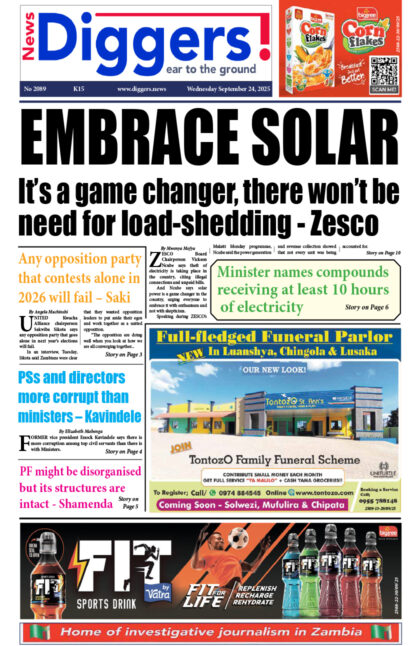MMD National Secretary Raphael Nakacinda has expressed scepticism about the ruling party’s participation in the 2021 elections.
And Nakacinda says the health bill is a good initiative, although it has come with a number of concerns and unanswered questions.
Speaking during Radio Christian Voice’s The Chat Back yesterday, Nakacinda said the former ruling party would not take any risks by prematurely answering whether or not they would participate in the 2021 elections.
“We don’t think as MMD, it is a question that we would answer prematurely, because we have work to do. We are undertaking a programme of mobilization. In 2015, we had to take a moment of just looking at ourselves. Is the machinery of the party in place? Have we been able to lubricate this machinery to carry us effectively into an election and be able to win? Not just forcing a re-run with the threshold that has been upped to 50+1. We are working on our party, and MMD, we are a democratic political party. Decisions of that nature are not made by individuals, they are made by the collective. That’s how come every five years before we face an election, we go to the convention,” Nakacinda said.
“Even the issue of us going into an alliance with the PF was not Hon. Felix Mutati deciding as an individual to say ‘this is what we are going to do’. It was a process of deliberation at a convention. So, the Zambian people must not force us to do things that are anti-democratic tendencies. I think they should actually be proud of MMD that we are careful to make sure that power continues to remain in the hands of the citizens. That attitude of the leadership of the party is what you eventually come to benefit from when we get into government. Then we are not going to take decisions arbitrarily.”
He said the MMD would push ahead its partnership with the PF.
“We are always going to be mindful of the fact that the power remains with the people. Therefore we have to go back to the people to give us the mandate on any decision that we are going to make. We believe leadership has to be taken back to the people. For now, we have a relationship with the PF and we are going to continue pushing that relationship to work in the interest of the Zambian people and when the time arises, that question will be answered with the same courage we summoned to be able to address the issue of 2016 election. We are going to summon that same courage and deal with the question of the 2021 election when the time arises,” Nakacinda said.
And Nakacinda said the health bill had raised a lot of anxiety and questions amongst citizens.
“Our view is that the process of consultation has not been holistic on this bill. To that effect, it is has raised a lot of anxiety and questions for many Zambians. I think had government taken the liberty to reach out to the Zambian people and get everybody to have an input in it and abiding, I don’t think the debate we are having today would be there. We are saying to government, we are saying to the Minister of Health that you did not undertake a thorough consultative process on this subject. First of all, the health insurance bill is not bad in itself because basically, government is trying to find means in which resources will be generated to support health institutions and improve the conditions of services for the health providers in the quest to improve the service that is rendered to the citizen,” he said.
“The only challenge that it comes with is the fact that of course, people are asking questions on how much it will cost citizens for them to be part of the policy. We are hearing figures being floated around; two to three per cent, all these speculations. Obviously you don’t expect that such a policy would work for those who are in informal economic activities. The target will be those that are in formal jobs public and private.”
Nakacinda said he foresaw a situation where the smallest population would be the one to finance improvements in the health sector.
“When you look at the percentage of those that are in formal employment, the percentage is very low. We are still grappling with the issue of creating jobs. So we are going to have a situation where, the smallest percentage of our population is the one that is the one that is going to more or less finance the improvement of health facilities and also provide the resource required for improving the working condition of those that are providing the service. How do you then capture the larger population which is in informal economic activities? There are people who just depend on farming, which is seasonal. There are people who depend on doing kantemba (tuck shops) here and there. That’s how you find, because of the cholera situation in Lusaka particularly for example, we have ended up finding people moved from the streets and I think government is still trying to find alternative places for trading. And that has affected the economy to some extent,” said Nakacinda.
“So as MMD, we are saying it has worked in other countries. In South Africa, they have something called health aid where you go and subscribe and pay a particular premium. And whenever they are faced with a health challenge, they will go to the hospital and they will be provided with high quality services. I think depending on how it is crafted, we are yet to see the text of it. It will be helpful for our health sector; it will also be helpful for our citizens. But these questions must be answere.”
























